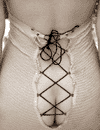......................
SUBSCRIBE FREE
-

SEX . FUN . WISDOM
The Dr. Susan Block Show
......................

WHAT'S NEW?
......................
Now in 15 countries!
......................
GALLERY
......................
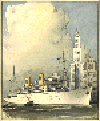
TRAVEL
..............................................

RADIOSUZY1.COM
.......................

RADIO SEX TV on HBO
.......................

MEMBERSHIP HAS ITS
P L E A S U R E S
.......................

BOUDOIR SEX TOYS
.......................
PRESS AREAS
BIOS OF PRINCIPLES
....................... -
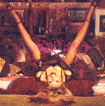
-
PRESS QUOTES
.......................

EROS PAGES
.......................
FRONT PAGE
DR. BLOCK'S JOURNAL
RADIOSUZY1.COM
SPEAKEASY GALLERY
BONOBOS
TRAVEL & REVIEWS
PRESS ROOM
LAPD PAGE
GREAT LINKS
GET ON OUR E-MAIL LIST
SHOPPING & SERVICES
NEW SHOPPING & SERVICES
DISCUSSION GROUP
...........................
. .
.
PHONE SEX THERAPY
BOUDOIR SEX TOYS
VIDEOS
BOOKS
EROTIC ART
TICKETS & TOURS
INNER SPACE
LASSE BRAUN
THE BONDAGE CROSS
PRIVATE GALLERIES
STREAMING VIDEO
STORE LOCATOR
CLASSIFIED ADS

Need to Talk?
.....................

.....................
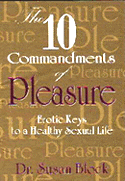
Read Dr. Block's
10 Commandments of
P L E A S U R E
......................
HOT HOLIDAY SEX

to take away the
cold, dark, winter
BLUES
......................

MOULIN ROUGE!
An Electrical Parade with Garters! -

QUILLS: A Review of
Philip Kaufman's
Film About the
Marquis de Sade
......................

FLOWERS, DILDOS&
PHENYLETHYLAMINE
......................
SEX & TECHNOLOGY:
A MARRIAGE MADE IN
MILLENNIUM MADNESS
FRIGHTENINGLY HOT SEX:
A Halloween Greeting
from Dr. Susan Block
......................

Feet: A Love Story
Speakeasy Grand Opening
......................

CROSSDRESSERS
FOR CHRIST -
......................
Impeachment Chronicles
......................
Dr. Susan Block's
DR. LAURA DIARIES
Washington's Sex Addiction
Read All About It
KOSHER SEX:
Oneness Through Shtupping
HALF
PAST AUTUMN:
The Life & Works of GORDON PARKS
PLASTIC
FANTASTIC LOVER
AMERICAN SWING
Travels
with Max: ON VIAGRA
KEN STARR: A Pornograher For Our Times
SEX ACTS IN SOHO with Heilman-C
LOLITA: a film review
.....................

Dr. Block's Story of QUEEN ESTHER:
How a Sexy Young Woman Used the
Power of Seduction to Save Her
People from Genocide
.....................
.....................
EROTIC
ART REVIEW
by NEW TIMES MAGAZINE
....................

YALEGASM
....................
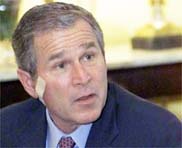
Elections, Erections, Fuzzy Numbers & Falling On Your Face in The
Divided States of America
....................

See Dr. Susan Block's
DEMOCRATIC SEX
U N C E N S O R E D
.....................

BUSHMAN
.....................
A
D E L P H I A
FAMILY CENSORS

Dr. Block's Open Letter
to John J. Rigas
.....................

Titillating
Tidbits of Democratic Sex
at the Democratic Convention
.....................

MAYOR
DICK
APOLOGIZES
TO DR. SUZY!
....................
ADDICTION
A Modern Sense of
S
i N
by Dr. Susan Block

VIDEO PHOTO: MAX
Addiction. It is the contemporary equivalent of sin. Major organizations, not to mention every other underemployed hack who hangs up a shingle and a URL, promises cures for our addictions, like churches vowing to save our souls from our sins, like snake-oily pseudo-scientists claiming to cure the human condition, like bomb-cocky generals pledging to win the war. This is the War at Home, the New World Order Civil War, the War on Drugs, and drugs are only a part of this crazy, hazy war. Self-proclaimed gurus with troubled pasts ascend their pulpits to tell us that we must--at any cost--break our addictions, sever our alliances, squash our dependencies on substances, people, sex, work, exercise, love, day trading. They seem to be trying to purge America of addictions like Stalin purged the dissidents. And no, our accused aren't executed so frequently as those under Uncle Joe (except maybe in Texas, under Uncle Dubya). But there's no lack of them in our prisons, being punished for their sins of addiction right alongside the murderers, rapists and thieves.
Ah, addictions. Gotta love 'em. Gotta hate 'em too, sometimes. But first, gotta love 'em, or we wouldn't have 'em in the first place. Addictions are the spices of our lives. Of course, too much spice spoils the enchilada. But without a little salsa, it's just beans and dead meat.
the
only way to truly master
something is to become
passionately, obsessively
addicted to it.
Without our addictions, our obsessions, our manias, we wouldn't even just be animals; we'd be plants. Not even plants. We'd be machines. Our addictions are woven into the fabric of our lives. They give us a taste of paradise. It may be a temporary paradise, and it may be an artificial paradise, and it may be a dangerous paradise; it may even be a doomed paradise, a heaven that turns into hell. But the pursuit of paradise--ecstasy, bliss, happiness, nirvana, heaven--is one of the great natural drives of humanity, maybe even of all intelligent life on earth.
Then there's passion. Judging from history, my own, as well as the world's, it seems to me that the only way to truly master something is to become passionately, obsessively addicted to it. Without the driving vigor of our addictions, we surrender to mediocrity, bureaucracy, being "functional." The world's greatest artists, many of our greatest statesmen, even some of our greatest scientists, and certainly our greatest lovers have been notoriously addictive personalities, all living and dying in overheated pursuit of paradise, pleasure, power and love.

PHOTO: TOM ZIMMERMAN
Everybody's addicted to something, even if it's the philosophy of not getting addicted to anything. Some of us channel our addictive drives into stuff that society deems safe or constructive, like work, even though the heroes of our culture, the work-driven, successful businessmen and stock traders, are more likely to die young of a heart attack (or jump out the window when the stocks crash) than the pot-smoking slackers. Shopping is another socially sanctioned narcotic, until your Visa's maxed out. Then there's prescription drugs, an all-American addiction with soothing spike1celebrity-studded ads all over late night TV, and you don't even have to worry about Visa if you've got the insurance.
every
night, hundreds of police officers hang out at Winchell's...mainlining
coffee and donuts...high as kites
on sugar and caffeine...
fully armed and paranoid...
ready to shoot some poor
witless junkie who reaches for
his or her ID the wrong way.
Some star-crossed folks, due to chemistry and circumstances, happen to get addicted to things which are not blessed by Wall Street or the FDA, NBC, CBS or AOL, but have been deemed to be "bad" for us, and are therefore illegal. Most of these individuals get by all right, obtaining their little fixes and ounces from discreet underground sources. Some even go on to become President of the United States. But many, usually those less well-off, get arrested, thrown into jails, sometimes beaten, shot and killed by police officers, most of whom are extremely addicted to caffeine and sugar, substances that have been deemed "dangerous" and illegal by other cultures at other times in history.

VIDEO PHOTO: ONIE MONTES
Here's the situation: Every night, hundreds of police officers hang out at Winchell's or 7-11, mainlining coffee and donuts. Then they go out onto the streets high as kites on sugar and caffeine, eager for action but scared shitless of some maniac they just saw on TV. They're buzzed, they're high, they're fully armed and paranoid. Then they mount their copmobiles, ready to shoot some poor witless junkie who reaches for his or her ID the wrong way.
It's become apparent to even the most conservative judges in the land that he only way to stop, or at least decrease, the drug-related killing in our cities, is to end the War on Drugs. It's very much like some of those other wars we never really won that went on and on against exotic enemies we didn't quite understand, only this one's not being fought in Southeast Asia or the Middle East. It's being fought right here at home against our own people, a war against ourselves.
Not that we don't have drug problems; of course we do. Every society does, just as every society has sex problems. But outlawing certain drugs in order to solve drug problems is like outlawing sex in order to solve the problems of AIDS or infidelity.
Although some neo-puritan fanatics might like to try, you can't get people to stop having sex. And you can't get people to stop doing drugs. UCLA psychopharmacology professor Ronald K. Siegel calls the urge to intoxicate ourselves "the fourth drive", as natural and persistent as our drives of thirst, hunger, and sex. Modern laws against drugs are as futile and incendiary as Prohibition Era laws against alcohol when gangster bootleggers ruled urban America. When we repeal the War on Drugs, just as we repealed Prohibition, and treat addicts instead of jailing them, then we'll go a long way toward learning to deal with all of our addictions.
The
Seven Deadly Sins
have given way to the
Seven Deadly Addictions.
It goes beyond questions of legality. Indeed, the very idea of addiction has assumed that frightening, humiliating place in our hearts and minds that a sense of sin used to occupy. To be a "sinner" is now cool or no big deal, like wearing leather pants or playing in a band. Nobody's ashamed to be a sinner anymore. But an addict? To be an addict is to be what a sinner used to be: weak, lustful, doomed, despised, disgraced, diseased (unless you're a celebrity with a sharp manager who can turn your addiction into a publicity ploy). The concept of "Original Sin" is almost meaningless to the modern mind. But the "Addictive Personality"? We can all relate to that.

PHOTO: THOMAS LANE
BONDAGE
CROSS: MARIO SAUCEDO
The Seven Deadly Sins have given way to the Seven Deadly Addictions: Alcoholism, Drug Addiction, Food Obsessions, Workaholism and Gambling Mania are the first five. I'd put Exercise Junkies into the category of Workaholism. After all, an obsession with Working Out is just a variation on overworking. I'd place Stock Market Day Trading squarely under Gambling Mania.
Everybody's
got a problem
with codependency,
except the occasional
sociopath.
Then there's the ultra-demonized Sex Addiction. Just about every horny person I talk to, male or female, worries that they're a Sex Addict, or else someone has called them one in a fit of righteous indignation. The perceived "problem" of sex addiction has certainly grown since the Presidential Sex Scandal of 1998, though thanks to the Presidential Exoneration of 1999, Sex Addiction did not become grounds for losing a government job. Of course, several past US Presidents could have been considered "Sex Addicts," from Thomas Jefferson to Warren Harding to FDR to JFK, but William Jefferson Clinton was the first to be defined as such.
So, what exactly is Sex Addiction? No one really knows. But apparently, an interest in any type of sex other than monogamous-missionary-position-sex-within-marriage-with-the-lights-off could qualify you. So, if you, say, masturbate regularly, look at pornography, have an affair, go to swing clubs, go to strip clubs, dance in strip clubs, see a dominatrix, work as a dominatrix, wear panties under your clothes (if you're a guy) or over your clothes (if you're a gal), own more than three pairs of stiletto heels (if you're a guy or a gal), have phone sex, or if you fantasize about anyone or anything other than your beloved, you are "at risk" of being branded a Sex Addict, the most shame-ridden sinner of the turn of the 21st century.

PHOTO: ELISE HABER
If you host a show about sex in a bed wearing lingerie surrounded by dildos and vibrators and vulva puppets under a giant photo of a bonobo chimpanzee, you might as well have "SeXXX Addict" tattooed across your cleavage. Yes, I confess, I'm a Sinner, Oh Lord and Lady, I'm a Sinner, addicted to sex and obsessed with love.
There's
nothing wrong with
being addicted to love.
Just don't get addicted to
loving a jerk.
Which brings me to the last but certainly not the least of the Seven Deadly Addictions: Codependency: Addiction to people you love. This one's a mass attacker. Everybody's got a problem with codependency, except the occasional sociopath. But what normal, people-oriented person has not suffered from the deep, sweet agony and ecstasy of codependency, of love addiction? Over the past several years since it was "identified" as an addiction by various Anonymous Do-Gooders, "codependency" has spread like the flu, because who can't relate to the symptoms, who hasn't yearned to hold and be held, to care and be cared for?
Whoever experiences the giddy ecstasy of love next learns the pain of disappointment, the sorrow of betrayal, the denial of the pain, the enabling of denial. But is it really a disease? What's so diseased about loving, needing and depending on others who love, need and depend on you? Codependency is what sharing your life with someone you love is all about. Chronic fear of codependency leads to "addiction to perfection"--a phrase coined by Marion Woodman to describe chronic fear of involvement with others-- a far more debilitating affliction than lovesickness.
Of course, any addiction, to love or anything else, can have negative consequences, ranging from separation anxiety to murder, if a toxic combination of character and circumstances comes into play. But codependency itself is not "dysfunctional." There's nothing wrong with being addicted to love. Just don't get addicted to loving a jerk.

PHOTO: THOMAS LANE
So, if you really feel you've found the one, why not give it all you've got? As the 18th century French playwright P.A.C. de Beaumarchais once said long before there were "Women Who Love Too Much," but not before there was romance and heartbreak, "Where love is concerned, too much is not even enough." (and where criminal punishment for the sins of addiction is concerned, any amount of time that a hemp smoker spends in jail is too much!).
And yes, you could make a mistake. You could find yourself addicted to someone or something that's destroying you. Then you must make the Herculean/Xena-like effort to extricate yourself from your addiction as from the jaws of a many-headed hydra. If you defeat the hydra, you'll be a hero. If the hydra defeats you, well, it happens to the best of us.
Drug
Warmongers bleat plaintively that anyone who takes illegal intoxicants
is self-destructive. All addicts are self-destructive. Relationships
are self-destructive. Work is very self-destructive, especially work
you're passion about, that you surrender to. Life itself is self-destructive.
From the moment we are born, we begin to die. Just writing this column,
one of my own personal addictions, is killing me a little with every
sentence. So, I think I'll stop for now. You get my point. I'm an addict,
not a nihilist.

PHOTO: JOLIE BARRY
MY OUTFIT: ULTRAVIXEN
![]()
![]()



